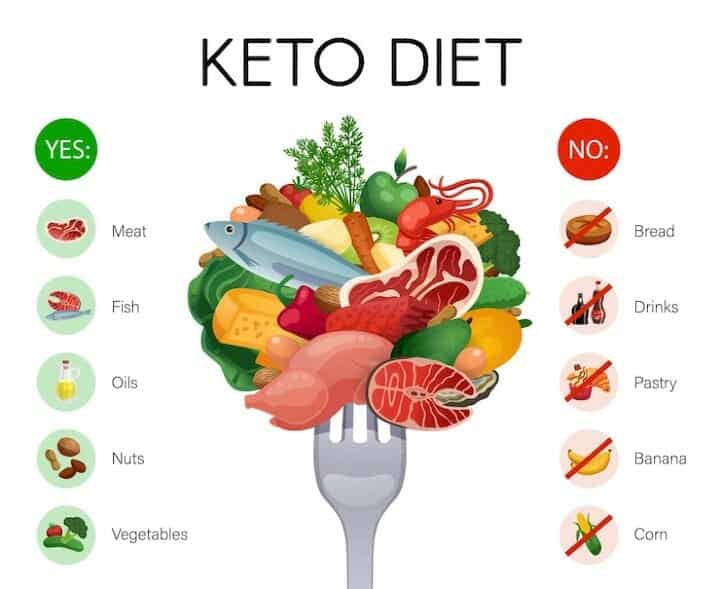Low Carb diets have been the topic of big debates for many years, and athletes are no exception. With an increasing focus on health and nutrition among professional athletes, low-carb diets are becoming more popular than ever before. But just how do these diets affect performance? In this article, we’ll explore the effects of a low-carb diet on athletic performance and provide tips to help ensure you get optimal results from your regimen.

Low Carb for Athletes
The popularity of low carbohydrate diets has grown exponentially over the past decade. Many athletes use them when they want to reduce body fat or improve their overall physique. But what about the impact such a diet might have on physical performance? Recent studies suggest some evidence linking reduced carbohydrate intake with improved aerobic capacity and increased strength gains in elite athletes, but further research needs to be conducted to fully understand the implications of such dietary changes on sports performance.
This article will examine carbohydrates’ role in fueling exercise and muscle growth while also exploring potential benefits and risks associated with reducing carbohydrate intake for competitive athletes. We’ll look at how different levels of carbohydrate intake may affect both short-term and long-term athletic performance so that readers can better decide if it’s worth making any changes to their current nutritional plan.
Table of Contents
What Is A Low-Carb Diet?
When it comes to dieting, the low-carb lifestyle is becoming increasingly popular. But what does this phrase mean? A low-carb diet focuses on drastically cutting down the amount of carbohydrates consumed and replacing them with protein and healthy fats. This type of eating can help people maintain or lose weight by making their bodies burn fat for fuel instead of carbs. It also has benefits beyond just weight loss; athletes are beginning to explore how a low-carb diet can improve performance in their sport.
The most crucial distinction between a traditional diet that relies heavily on grains, starch and sugar versus a low-carb one is simple: fewer carbs means more fat as an energy source. Low-carb diets replace carbohydrates with proteins and unsaturated fats from foods like fish, nuts, eggs, oils, and avocados. In general terms, this kind of dietary change helps slow digestion, which might lead to lower levels of hunger hormones circulating throughout the day. As well as helping you feel fuller longer, this could aid in maintaining better blood glucose control when engaging in intense physical activities such as athletics or long endurance events such as triathlons.
By reducing the reliance on carbohydrate fuels during exercise and shifting towards burning fatty acids for energy production instead, prolonged periods of training may become easier to manage while still allowing peak performances at times when necessary – all without having to resort to high amounts of processed snacks or sugary drinks before workouts or competitions. With these potential advantages being explored daily, let’s look at some specific ways that going low-carb can benefit athletes looking to take their game up a notch.
Benefits Of Low-Carb Diets For Athletes
The low-carb approach to fueling the body presents several potential benefits for athletes. One key advantage is that it can decrease inflammation, which can be beneficial when recovering from intense training sessions or competitions. This diet also helps stabilize blood sugar levels and reduce fatigue during workouts, allowing athletes to push themselves harder without feeling as drained afterward. Additionally, going low-carb may help speed up weight loss for those looking to shed pounds to reach specific performance goals; this could give an edge over competitors relying on traditional diets with higher carbohydrate content.
Athletes need not worry about depriving their bodies of energy while following a lower carb regimen either – as long as they eat enough healthy fats and proteins and get adequate hydration, their muscles should still have access to the fuel necessary for optimal performance. Furthermore, because carbs produce more insulin than other macronutrients such as protein or fat, switching away from them will likely lead to better control of hormonal balance during exercise and competition. All these advantages together make a compelling case for why many athletes might do well by adopting a low-carb lifestyle.
By considering all the positive effects of reducing carb intake, one must then focus on what sort of macronutrient considerations arise when attempting such a dietary shift.
Macronutrient Considerations
In many ways, athletes are like navigators on a journey – they must constantly adjust their course to ensure they reach their destination safely and efficiently. When it comes to nutrition, the same principle applies; one must be willing to make calculated changes in order to optimize performance and remain healthy.
For those who choose to go low-carb, carb replacement is essential for maintaining energy levels during workouts or competitions. A good place to start would be to focus on getting enough protein and fat while reducing the daily intake of carbohydrates. This could mean switching out some starchy vegetables such as potatoes or corn with leafy greens like spinach or kale, swapping traditional grains with nuts or seeds, and opting for healthier fats such as olive oil over butter or margarine. Additionally, adequate hydration should also be considered when making any major nutritional shift to avoid dehydration-related issues that can impair athletic performance.
The idea here is not necessarily about completely cutting out carbs from an athlete’s diet but rather finding a balance between different macronutrients so that the body gets all the necessary nutrients without compromising health or performance. The right blend of proteins, fats and carbohydrates is key if you want your training sessions and competitions to stay at peak efficiency. After all, there’s no use pushing yourself harder if you don’t have the fuel required to do so! With this in mind, let us turn our attention towards the potential drawbacks of going low-carb for athletes.
Potential Drawbacks For Athletes
When it comes to low-carb diets, athletes must be aware of the potential drawbacks. Firstly, a lack of carbohydrates can lead to decreased energy levels during workouts and competitions and increased fatigue after exercise. This is because carbohydrates are essential for providing fuel to muscles during periods of intense physical activity. Additionally, since carbs also provide essential vitamins and minerals such as B Vitamins, magnesium and iron that aid in muscle growth and recovery, cutting them out may result in inadequate nutrient intake, which could impact performance over time.
Finally, it’s important to note that going too low carb can cause issues with digestion due to the body not having adequate dietary fiber from plant sources like grains or beans. Low-fiber diets can lead to constipation, bloating and other digestive discomforts – all things no athlete wants! Despite these aspects, there are ways for athletes to safely transition into a lower-carb lifestyle, with the help of a guided approach, without compromising their health or performance.
By considering these potential risks when making any nutrition changes, athletes can reap the benefits of a low-carb diet while avoiding any adverse effects. Next up, we’ll look at some tips for adopting a low-carb diet while still maintaining optimal athletic performance.
Tips For Adopting A Low-Carb Diet
For athletes transitioning to a low-carb lifestyle, it’s essential to take the process slowly and ensure you are getting adequate nutrients. Firstly, begin by gradually reducing your carbohydrate intake over time rather than cutting them out entirely or going ‘cold turkey’ overnight – this can help minimize any potential side effects that might occur due to suddenly limiting carbs.
When looking for foods to incorporate into your diet, prioritize nutrient-dense proteins like lean meats, eggs and fish; healthy fats from sources such as nuts and olive oil; and fibrous vegetables like spinach, kale and broccoli. These provide more nutritional value than processed carbohydrates such as bread or pasta while still providing enough energy for workouts. Additionally, supplementing with vitamins and minerals can also be beneficial in ensuring optimal nutrient levels while on a lower carb diet.
These steps will ensure that an athlete’s new eating plan is healthful and sustainable during their transition period. By taking care when making nutrition changes and being mindful of how they affect performance, athletes will have greater success in maintaining a low-carb diet while still performing at their best. Now let’s look at some tips for monitoring progress along the way.
Monitoring Performance Progress
When adopting a low-carb diet, monitoring performance progress is crucial to ensure training goals are being met. It’s important to note that changes may not be immediate and could take several weeks or months before any noticeable improvement is seen; however, tracking progress can help make sure the new eating plan is working as intended.
For athletes transitioning to a low-carb lifestyle, keeping accurate records of energy levels, sleep quality and physical performance each day can give an indication of how well their body is adapting. Additionally, recording weight loss (if desired) and taking regular measurements such as waist circumference can also provide valuable insight into overall health status throughout the transition period.
Overall, careful monitoring during the transition process is key for ensuring success with a low-carb diet for athletes. Tracking various aspects including energy levels, sleep quality, physical performance and body composition over time will allow athletes to adjust their approach as needed in order to reach their optimal performance level.
Conclusion
In conclusion, the appropriate use of a low-carb diet can be beneficial for athletes looking to improve performance. It is important to remember that each athlete may respond differently to this type of diet and it should only be adopted carefully. Macronutrient considerations are also essential when adopting a low-carb lifestyle as certain ratios of carbohydrates, proteins and fats must be achieved to reap maximum benefits from the dietary change. With careful monitoring and adjustments, an athlete can enjoy improved performance outcomes through the judicious application of a low-carb diet.
Coincidentally enough, what works well for one athlete might not work well for another – so trial and error is often necessary in order to determine which approach will yield the best results!
Additional Reads
You might also benefit from listening to/ reading interviews of eminent sports science expert and LCHF proponent for athletes: Prof. Tim Noakes. Here are a few links for your reference.

